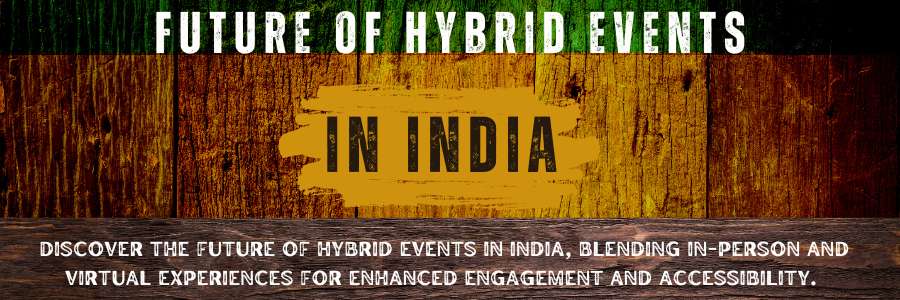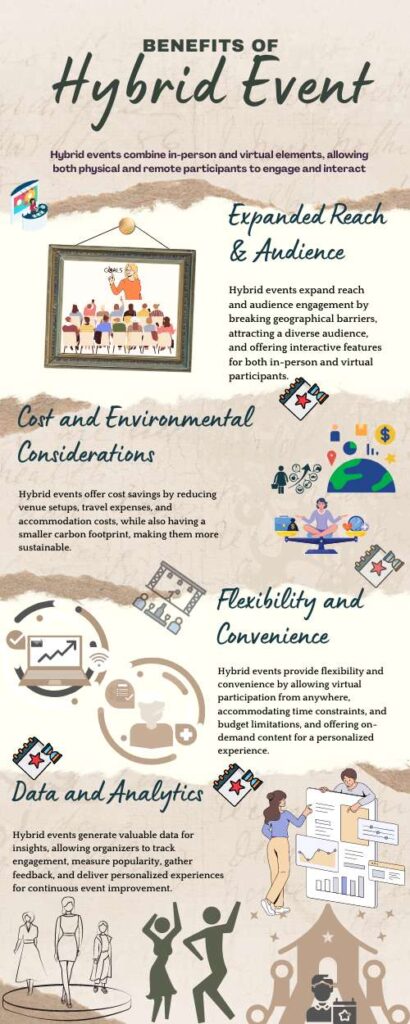FasDes- Best Fashion Designing and Modeling College in Jaipur

The Future of Hybrid Events in India
- Introduction
- Understanding Hybrid Events
- Benefits of Hybrid Events
- The Evolving Role of Technology in Hybrid Events
- Overcoming Challenges and Ensuring Success
- Conclusion
Introduction
Understanding Hybrid Events
Hybrid events are a new event format that combines in-person and virtual elements. They utilize technology platforms to bridge the gap between physical and digital environments, allowing both physical attendees and remote participants to engage simultaneously. Hybrid events emerged as a response to the challenges posed by the COVID-19 pandemic, providing a flexible and inclusive solution. They offer the benefits of expanded reach, cost savings, flexibility, and convenience. By blending in-person and virtual experiences, hybrid events are transforming the events industry and shaping the future of event formats.
Benefits of Hybrid Events
Expanded Reach and Audience Engagement
One of the primary benefits of hybrid events is the expanded reach and increased audience engagement they offer. By incorporating virtual elements, hybrid events break down geographical barriers, allowing participants from around the world to attend. This expanded reach not only boosts event attendance but also diversifies the audience, fostering new connections and collaborations. Additionally, virtual components provide interactive features such as live polls, chat rooms, and networking opportunities, enhancing audience engagement and creating a more immersive and interactive event experience for all attendees, both in-person and virtual.

Cost and Environmental Considerations
Hybrid events offer significant cost and environmental considerations compared to traditional in-person events. By reducing the need for extensive venue setups, travel expenses, and accommodation costs, hybrid events provide cost-effective solutions for organizers. This can result in substantial savings in event budgets. Additionally, hybrid events have a smaller carbon footprint as they reduce overall travel and associated emissions. By incorporating virtual elements, attendees can participate from their locations without the need for extensive travel, contributing to a more sustainable future. These cost and environmental considerations make hybrid events an attractive and responsible choice for event organizers.
Flexibility and Convenience
Flexibility and convenience are key advantages of hybrid events. By incorporating virtual participation, hybrid events offer attendees the flexibility to join from anywhere in the world, eliminating the need for physical travel. This convenience allows individuals with time constraints, budget limitations, or mobility issues to participate in events that were previously inaccessible. Hybrid events often provide on-demand content, allowing participants to access sessions and resources at their convenience. This flexibility and convenience enhance the attendee experience and cater to the diverse needs of participants, making hybrid events a flexible and convenient option for both organizers and attendees.
Data and Analytics
Hybrid events generate a wealth of data that can be leveraged to gain insights and optimize future events. With robust analytics tools, organizers can track attendee engagement, measure session popularity, and gather feedback. This data-driven approach enables organizers to make informed decisions, improve event experiences, and tailor content to the preferences and interests of attendees. Data and analytics also provide valuable information on attendee behavior, demographics, and preferences, which can be used to deliver personalized recommendations, targeted networking opportunities, and customized event experiences. Harnessing data and analytics in hybrid events allows organizers to continually refine and enhance their events, ensuring maximum impact and engagement.
The Evolving Role of Technology in Hybrid Events
The success of hybrid events heavily relies on technological advancements and their seamless integration. The evolving role of technology in hybrid events encompasses live streaming and virtual platforms, augmented reality (AR) and virtual reality (VR), artificial intelligence (AI), chatbots, and data analytics, enhancing engagement, personalization, and seamless integration between physical and virtual environments. The following are key technologies driving the future of hybrid events:
- Live Streaming and Virtual Platforms
Live streaming technologies and virtual platforms play a pivotal role in the success of hybrid events. Live streaming allows remote participants to access and engage with keynotes, presentations, and sessions in real time. It bridges the gap between physical and virtual attendees, enabling seamless interaction and participation. Virtual platforms provide a digital event space where attendees can access event content, engage in discussions through chat functions, participate in breakout sessions, and network with other participants. These platforms offer a user-friendly interface, interactive features, and networking tools to create an immersive and engaging experience for both in-person and virtual attendees, ensuring the success of hybrid events.
- Augmented Reality (AR) and Virtual Reality (VR)
Augmented Reality (AR) and Virtual Reality (VR) technologies are transforming the hybrid events landscape by offering immersive experiences to both in-person and virtual attendees. AR can overlay digital information onto physical event elements, such as interactive maps, exhibitor information, or contextual information about sessions. This enhances the engagement and interactivity of physical attendees. VR, on the other hand, creates virtual environments that simulate the experience of attending an event physically. It allows participants to interact with the virtual space, explore virtual booths, and engage in virtual networking activities. AR and VR technologies enhance the overall event experience, making hybrid events more captivating and memorable for attendees.
- Artificial Intelligence (AI) and Chatbots
Artificial Intelligence (AI) and chatbots are revolutionizing hybrid events by providing personalized assistance and enhancing attendee experiences. AI-powered chatbots can be integrated into virtual platforms to answer frequently asked questions, guide attendees through the event, and provide real-time support. These chatbots utilize natural language processing and machine learning algorithms to understand attendee queries and deliver relevant information. AI also enables data analysis, allowing organizers to gain insights into attendee preferences and behavior, and deliver personalized content recommendations. By leveraging AI and chatbots, hybrid events can offer personalized and interactive experiences, streamline communication, and ensure attendees have a seamless and enriching event journey.
Overcoming Challenges and Ensuring Success
While hybrid events offer immense potential, they also come with their share of challenges. Event organizers must address several key factors to ensure the success of hybrid events:
Seamless Integration
Seamless integration is crucial for the success of hybrid events. It involves the smooth blending of physical and virtual components to create a cohesive and immersive experience for all attendees. This integration encompasses technical aspects such as high-quality audiovisual production, reliable internet connectivity, and user-friendly interfaces that facilitate seamless transitions between in-person and virtual environments. It also involves aligning the content, scheduling, and engagement opportunities to ensure that both physical and virtual attendees can actively participate and interact. By achieving seamless integration, event organizers can create a unified event experience that maximizes engagement, fosters connections, and delivers a consistent and enjoyable experience for all participants.

Engaging Hybrid Experiences
Creating engaging hybrid experiences is essential for the success of hybrid events. Event organizers need to design experiences that cater to both in-person and virtual attendees, keeping them actively involved and immersed throughout the event. This can be achieved through interactive sessions, engaging presentations, gamification elements, and virtual networking opportunities. Leveraging technology tools such as live polls, interactive Q&A sessions, and virtual breakout rooms can foster engagement and encourage meaningful interactions. Additionally, personalized content recommendations based on attendee preferences and interests can enhance the overall experience. By prioritizing engagement, hybrid events can deliver memorable and impactful experiences that leave a lasting impression on attendees.
Accessibility and Inclusivity
Accessibility and inclusivity are essential considerations in the planning and execution of hybrid events. Event organizers must ensure that all attendees, regardless of their abilities or circumstances, have equitable access to event components. This includes providing closed captioning, sign language interpretation, and assistive technologies for individuals with hearing or visual impairments. User-friendly interfaces and navigation options should be implemented to cater to diverse needs. Additionally, fostering an inclusive environment that respects and embraces diverse perspectives and identities is crucial. This can be achieved through diverse and representative speakers, inclusive language, and actively addressing accessibility concerns. By prioritizing accessibility and inclusivity, hybrid events can ensure that everyone can fully participate, engage, and benefit from the event experience, creating a sense of belonging and fostering meaningful connections.
Want to learn Event Management?- Join our Courses Click Here
Conclusion
Hybrid events represent the future of event formats, combining the best of in-person and virtual experiences. They offer expanded reach, cost savings, flexibility, convenience, and increased audience engagement. With advancements in technology and seamless integration, hybrid events provide immersive and inclusive experiences for both physical and virtual attendees. Data and analytics drive continuous improvement, while augmented reality, virtual reality, AI, and chatbots enhance the event experience. Prioritizing accessibility and inclusivity ensures that all participants can actively engage and benefit from the event. By embracing hybrid events, organizers can create impactful and memorable experiences, shaping the way we gather, connect, and interact in a post-pandemic world.
